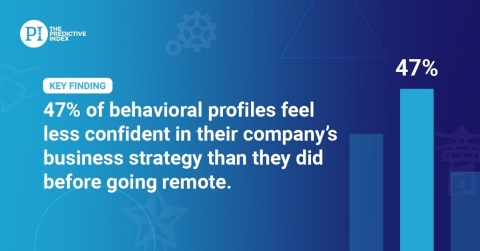Shift to Full-Time Remote Work is Well-Received, But Confidence in Company Business Strategy Wanes, According to the 2020 Impact of Behavioral Drives in a Remote Workplace Report
Shift to Full-Time Remote Work is Well-Received, But Confidence in Company Business Strategy Wanes, According to the 2020 Impact of Behavioral Drives in a Remote Workplace Report
In this study by The Predictive Index, 220 employees reveal what they love—and hate—about remote work; 77% would continue working from home, nearly 50% of profiles are less confident in company business strategy
BOSTON--(BUSINESS WIRE)--Companies may have been forced into full-time remote work amid the COVID-19 pandemic, but despite the lack of choice in the matter, employees are responding well. More than three-quarters of those surveyed reported a desire to continue working remotely, whether full- or part-time, even after social distancing mandates are eased.
Those who most enjoy working from home tend to lean all the way into it, with 40% saying they want to continue full-time remote work permanently. But the 2020 Impact of Behavioral Drives in a Remote Workplace Report, conducted by talent optimization leader The Predictive Index, reveals differing responses once respondents are grouped by personality type.
“Business leaders who analyze behavioral drives in this new remote environment can make changes proactively to enjoy a more productive and engaged workforce—leveraging the foundation of talent optimization: people data,” said Mike Zani, CEO of The Predictive Index. “Any CEO armed with this data can move off the issue of whether people are working as hard and move on to the more important issue: How do we best work remotely?”
Although remote work has been well-received, the report finds confidence in one’s business strategy dipped. Forty-seven percent of behavioral profiles reported feeling less confident in their company’s business strategy than they were before going remote, underscoring the importance of frequent and transparent communication during times of change.
Other key findings from the report include:
- Working remotely full-time was a huge change for many: 33% had never done it before.
- Outdated perceptions about remote productivity debunked: 40% of those surveyed reported their working hours were unchanged. Another 32% said they are actually working more hours from home than they did before.
- Meeting fatigue improved overall: Three of four behavioral groups reported feeling less exhausted by remote meetings than in-person meetings. Social profiles were the outlier, with 55% saying they have more virtual meeting fatigue.
- Persistent profiles more likely to be interested in working remotely full-time: Two highly autonomous behavioral profiles---the Individualist and the Scholar---were most content (67%) with remote work and the pace it affords.
- Stabilizing profiles least likely to want to continue working from home: Just 13% of those with Stabilizing profiles want to work remotely full-time, on a permanent basis.
- Analyzers happiest working from home: 80% of Analyzers said they were happier than they typically were in the workplace; 100% enjoyed the privacy of working remotely.
From a talent optimization standpoint, another theme emerged: Influencing and engaging employees looks different when working remotely.
- Exerting influence in virtual meetings is harder: All four behavioral groups confirmed this sentiment, with dominant personalities most likely to say their potential to influence a group meeting had diminished since moving from in-person to remote work.
- Companies aren’t recognizing remote employees enough: Regardless of behavioral type, about half of the employees surveyed felt their business could be doing more in terms of remote recognition.
- Connection and collaboration require more effort: Particularly among Guardians and Analytical profiles, team dynamics have been strained. In fact, 55% of Guardians reported feeling less connected to their teammates while working remotely.
A full copy of the Impact of Behavioral Drives in a Remote Workplace Report can be found here: https://go1.predictiveindex.com/content/reports/the-impact-of-behavioral-drives-in-a-remote-workplace.
About The Predictive Index
The Predictive Index (PI) is an award-winning talent optimization platform that aligns business strategy with people strategy for optimal business results. Over sixty years of proven science, software, and a curriculum of insightful management workshops make PI the solution for any company looking to design great teams and culture, make objective hiring decisions, foster engagement, and inspire greatness in their people anywhere in the world. More than 8,000 clients and 350+ partners use PI—including Nissan, Citizens Bank, DocuSign, Subway, 47 Brand, FAM Brands, Blue Cross Blue Shield, and Omni Hotels—across 140+ countries. Learn more at http://www.predictiveindex.com/.
Contacts
Jennifer Moebius
VP of Marketing - Brand & Comms
The Predictive Index
1-800-832-8884
